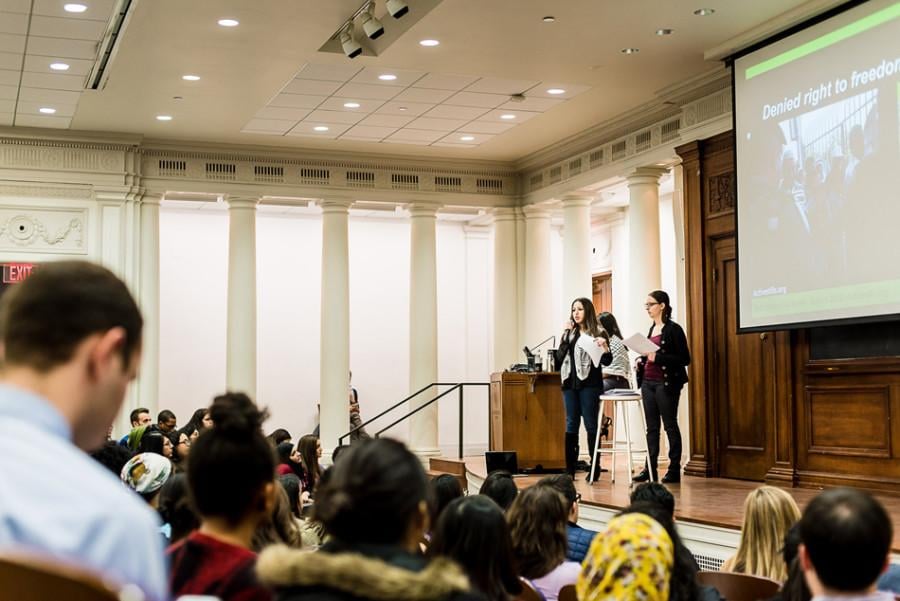Students form campaigns for, against divestment in Israel-Palestine conflict
Weinberg senior Serene Darwish speaks at “Palestine 101,” an event Friday hosted by Students for Justice in Palestine. The event kicked off NU Divest, a student campaign that seeks the divestment of University funds from corporations allegedly involved in human rights violations in Palestine.
January 28, 2015
Two student activist groups jumpstarted campaigns last week, one supporting and one opposing a movement for Northwestern to divest holdings from corporations allegedly violating human rights in Palestine.
NU Divest is calling for the University to divest from six major corporations involved in the “occupation of Palestinian lands,” according to the group’s website. The student group follows the Boycott Divestment Sanctions model, a international movement to economically and politically sanction Israel over human rights violations.
“I think we all just felt we no longer wanted to be complicit in the violation of human rights,” said McCormick senior Hagar Gomaa, who is involved in the movement. “Northwestern Palestinian students are essentially forced to fund war crimes against their own families.”
The same week, dissenting students went public with NU Coalition for Peace, a group calling to end the BDS campaign and to support a two-state solution in Israel, according to Communication senior Tina Umanskiy, a spokeswoman for the group. About 20 students were involved in the organization’s creation.
NU Divest published a letter to the editor in The Daily last Thursday, citing human rights violations in Palestine and announcing its goal of passing an Associated Student Government resolution to support divestment at NU. On Monday, Coalition for Peace published its own letter to the editor condemning the BDS movement for punishing Israel and forsaking peace negotiations.
Both organizations had paper ground fliers and written chalk messages densely spread across campus last week. As of Tuesday evening, NU Divest had about 870 likes on its official Facebook page, while Coalition for Peace had about 780.
Umanskiy said the two groups have not contacted each other so far.
NU Divest kicked off its campaign with “Palestine 101” last Friday, hosted by Students for Justice in Palestine, and a solidarity workshop Tuesday evening. Gomaa said the group has been setting up informational tables on campus and is planning to host a Palestinian cultural event and more workshops. NU Divest also released a video of students expressing their support. She said NU Divest plans to present its resolution calling for the University to divest at Senate soon.
Serene Darwish, who is involved in the divestment campaign, said as of Tuesday the group has no plans to reach out to the University.
“It’s hard to put an end date on a campaign like this,” the Weinberg senior said. “We want to end our complicity in this occupation of Palestinians, and that’s obviously not happening this quarter. … It’s going to continue no matter what happens with the resolution.”
Gomaa said NU Divest began organizing mid-Fall Quarter. She said NU has participated in similar campaigns in the past, including one to divest from companies involved in apartheid in South Africa.
In 2005, the University agreed to divest from four companies that did business in Sudan in response to genocide in the country’s Darfur region.
Gomaa said NU Divest was also inspired by student activists at other universities across the country participating in comparable movements. Darwish said NU Divest is not affiliated with a specific student group.
“What I love about this campaign is that we’re really looking beyond organizational boundaries,” she said.“It’s a cause-driven campaign. We see ourselves as part of a team.”
Coalition for Peace, Umanskiy said, is mainly focused on activism through social media, sharing several articles each week relating to its cause. It also promotes related events, such as NU Hillel’s Monday evening event featuring Israeli journalist and author Ari Shavit. The main goal of the page’s outreach is to educate students, Umanskiy said.
“I think (NU Divest is) really interested in grabbing attention of students who are not educated on the conflict but are interested in advocacy and human rights,” Umanskiy said. “But there is a lot of history and this conflict does not happen inside a vacuum.”
NU Divest stressed in its letter to the editor that students do not need to support a political opinion to agree with its goals. However, Umanskiy said “there is a second part of the movement that is political that we strongly oppose.” Coalition for Peace disagrees with BDS’ intention to cut off Israel-affiliated companies and to only blame Israel in the conflict, she said.
“The BDS movement in its entirety wants to weaken the Israeli economy and the state of Israel,” Umanskiy said. “There are a lot of consequences with that and they entail the weakening of the state of Israel.”
Similar campaigns have successfully been executed already, with student government resolutions supporting divestment passed at universities such as Wesleyan University, DePaul University and six University of California campuses.
In response to Coalition for Peace, Darwish said NU Divest is not focused on finding a political solution. NU Divest’s next event is a lecture featuring Rabbi Brant Rosen, a religious leader who supports divestment.
“We don’t have any power in Palestine-Israel, but what we do have is our status as students at Northwestern,” she said. “The conversation they’re trying to have has nothing to do with the conversation NU Divest is trying to push forward. It’s simply derailing it.”
Editor’s note: This post was updated for clarity at 8:59 p.m. and again at 11:30 p.m. on Jan. 28.
Email: oliviaexstrum2017@u.northwestern.edu
Twitter: @olivesocean
Email: aliceyin2017@u.northwestern.edu
Twitter: @alice__yin



